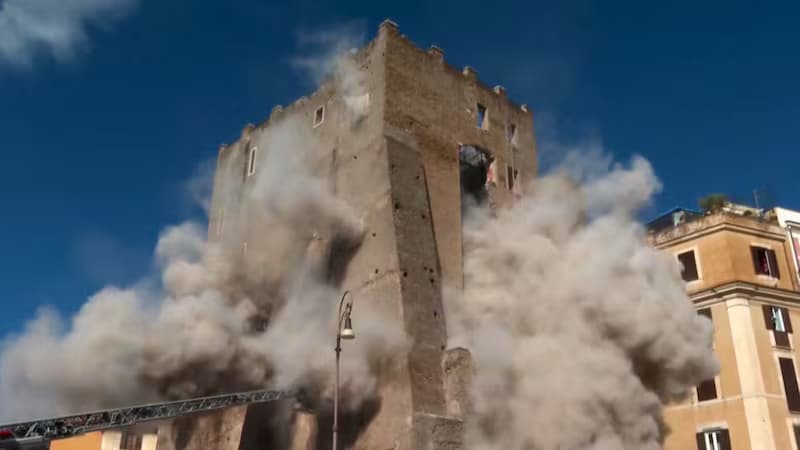We're loading the full news article for you. This includes the article content, images, author information, and related articles.
A deadly construction accident at a historic Rome tower highlights the perilous conditions often faced by migrant labourers, a reality that resonates with thousands of Kenyans working in similar sectors abroad.

ROME, ITALY – A Romanian construction worker died on Tuesday following the partial collapse of a historic medieval tower in central Rome, an incident that has triggered a formal investigation and cast a harsh light on the safety conditions for migrant workers in Europe. The tragedy serves as a critical reminder of the vulnerabilities faced by diaspora communities, including many Kenyans, engaged in high-risk industries globally.
The victim, identified as 43-year-old Octay Stroici, was pronounced dead at 12:20 AM EAT on Tuesday, November 4, 2025, by officials at Rome's Umberto I hospital. Stroici was part of a team conducting conservation work on the 13th-century Torre dei Conti, a landmark near the Colosseum, when a section of the structure collapsed shortly before midday on Monday. He was trapped under the rubble for nearly twelve hours. Despite being conscious and communicating with rescuers throughout the complex and dangerous operation, his heart stopped in the ambulance after being freed.
Three other workers were evacuated from the site; one, also a Romanian national, was hospitalized in critical condition. The Rome Prosecutor's Office has opened an investigation into the incident, with Italian media reporting potential charges of negligent disaster and negligent injuries are being considered.
While the workers involved were Romanian, this incident in a major European capital raises urgent questions about labour practices and safety enforcement that are deeply relevant to Kenya. Thousands of Kenyans work abroad, many in the construction and manual labour sectors in Europe and the Middle East, contributing significantly to the national economy through remittances. The risks they face, from inadequate safety gear to insufficient training and language barriers, are persistent concerns.
Studies on migrant construction workers in Europe have consistently shown they are at a significantly increased risk of workplace injury and death compared to native-born counterparts. Factors contributing to this vulnerability include being assigned to more physically demanding and hazardous tasks, language barriers hindering comprehension of safety protocols, and a reluctance to report unsafe conditions for fear of reprisal or job loss.
Italy's construction safety regulations are governed by Legislative Decree No. 81 of 2008, which mandates comprehensive risk assessment and safety planning. Furthermore, a new points-based safety license system for construction companies became mandatory from October 1, 2024, to improve compliance and reduce accidents. The investigation into the Torre dei Conti collapse will likely scrutinize whether all safety protocols were followed, particularly given the fragile nature of the historic site. Cultural heritage officials stated that structural surveys and load tests had been conducted before the work began in June 2025, which had confirmed the necessary safety conditions.
The rescue operation was fraught with danger. A second, smaller collapse occurred about 90 minutes after the first, sending up another cloud of dust and forcing firefighters to retreat temporarily. Emergency crews used drones, cranes, and specialized suction equipment to remove rubble in a delicate, hours-long effort to reach Stroici. Rome's Prefect, Lamberto Giannini, noted that firefighters had managed to erect some protection around the trapped worker, which shielded him from the second collapse.
The Torre dei Conti, built in the early 13th century for the family of Pope Innocent III, has a history of instability, having been damaged in a major earthquake in 1349. The renovation project was funded by the European Union and was reportedly near completion. The incident has not only prompted a safety probe but also a minor diplomatic spat after a Russian foreign ministry spokeswoman linked the collapse to Italy's financial support for Ukraine, a comment Italy's Foreign Minister Antonio Tajani condemned as "shameful."
For families in Kenya and across the world who rely on relatives working abroad, the death of Octay Stroici is a tragic illustration of the daily risks they endure. It underscores the universal importance of robust safety standards and the moral obligation of employers and governments to protect all workers, regardless of their nationality.
Keep the conversation in one place—threads here stay linked to the story and in the forums.
Sign in to start a discussion
Start a conversation about this story and keep it linked here.
Other hot threads
E-sports and Gaming Community in Kenya
Active 9 months ago
The Role of Technology in Modern Agriculture (AgriTech)
Active 9 months ago
Popular Recreational Activities Across Counties
Active 9 months ago
Investing in Youth Sports Development Programs
Active 9 months ago